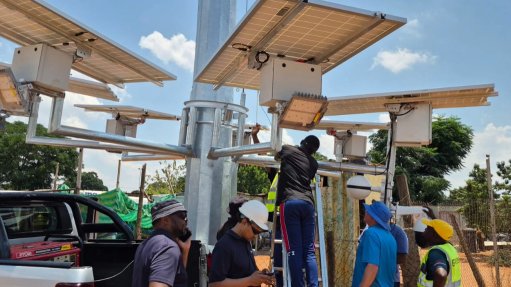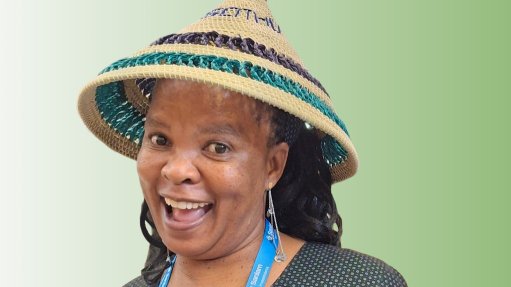Failure to heed warnings about a disease like Covid-19 a bigger risk than the disease itself – Whitfield
The major risk posed by Covid-19 is not the disease itself, but instead humankind’s inaction in heeding calls that such an event could lead to the crippling of global economies and other systems, independent broadcaster, journalist and writer Bruce Whitfield said on August 24.
He gave the keynote address during the forty-second annual conference of supply chain management professional body SAPICS.
Whitfield added that he concurred with a quote found on a “really cool T-shirt the other day”, which stated that “every single disaster movie starts with somebody ignoring a scientist”, saying this could not have been truer with the outbreak of the Covid-19 pandemic.
“We have been warned about Covid-19 and similar issues for decades,” said Whitfield, alluding that socially respiratory diseases have been on the rise in recent years.
He added that in the early 1990s and even earlier than that, humanity was warned that its biggest threat was not war, but a virus. “We were warned that in the future there would be a problem that is going to cripple humanity, which will be brought about by a virus.”
Meanwhile, Whitfield added that other scenarios humanity has been warned about were also currently playing out and changing the way people live. These include a rise in Earth’s temperatures and the potential for the planet to be more than 3 oC warmer than pre-industrial levels by 2050.
“We are seeing raging wildfires burning as we speak in northern Europe; we are seeing massive storms build and become increasingly intense, the massive droughts across the globe,” he stated.
Rising oceans were also a threat, as were crop failures, hunger and worsening poverty, which Whitfield said would ultimately lead to social unrest.
Although humanity has been warned about these factors for a long time, he said humans do not like to deal with things that could happen in the future, and instead, tend to focus more on the present. “That is perhaps why we do not plan particularly well.”
The biggest risk the Covid-19 pandemic poses, which Whitfield said has been well articulated by Melinda Gates, is that the pandemic has magnified every existing inequality in society.
Gate’s warning, he said, is particularly prescient in South Africa because locals have been warned for an “awfully long time” about a situation similar to the mid-July civil unrest, which resulted in looting, riots and destruction in KwaZulu-Natal and parts of Gauteng.
It is “hardly surprising” that there was a negative response to Jacob Zuma’s July arrest and jailing, said Whitfield. “We were warned it would happen; we were warned that people would take to the streets, and some people did take to the streets and protest against Jacob Zuma’s incarceration, and that is their democratic right to do so.”
However, he said that what followed was “catastrophic . . . It shows just how quickly things can go absolutely pear-shaped when you have an absolutely fertile environment.”
Nonetheless, he said South Africa was making progress in rebuilding the economy and rooting out corruption and governmental mismanagement.
“Jacob Zuma is jailed, and it does not really matter for what reason, the point is he is being held accountable for something he did wrong … we need to see him stand trial on the arms deal,” said Whitfield.
Further, other positive developments of late include the lifting of the licensing-exemption threshold for distributed generation plants to 100 MW. “That was an enormous concession,” he noted.
Also, the offloading of South African Airways was another positive step, as was Transnet’s agreeing to partner with the private sector to improve its ports capacity.
“Without an efficient ports system, you cannot have efficient supply chains. We know our ports are among the worst performing in the world,” said Whitfield.
There is also the splitting of Eskom into three separate divisions, which he stated was “absolutely” crucial in getting the electricity grid stable.
All things considered, Whitfield said, although South Africa and its citizens perpetually feel as though they are living “on the edge of chaos”, it is within that mess, noise and chaos that opportunity exists for things to improve and for businesses to come up with new solutions.
Article Enquiry
Email Article
Save Article
Feedback
To advertise email advertising@creamermedia.co.za or click here
Press Office
Announcements
What's On
Subscribe to improve your user experience...
Option 1 (equivalent of R125 a month):
Receive a weekly copy of Creamer Media's Engineering News & Mining Weekly magazine
(print copy for those in South Africa and e-magazine for those outside of South Africa)
Receive daily email newsletters
Access to full search results
Access archive of magazine back copies
Access to Projects in Progress
Access to ONE Research Report of your choice in PDF format
Option 2 (equivalent of R375 a month):
All benefits from Option 1
PLUS
Access to Creamer Media's Research Channel Africa for ALL Research Reports, in PDF format, on various industrial and mining sectors
including Electricity; Water; Energy Transition; Hydrogen; Roads, Rail and Ports; Coal; Gold; Platinum; Battery Metals; etc.
Already a subscriber?
Forgotten your password?
Receive weekly copy of Creamer Media's Engineering News & Mining Weekly magazine (print copy for those in South Africa and e-magazine for those outside of South Africa)
➕
Recieve daily email newsletters
➕
Access to full search results
➕
Access archive of magazine back copies
➕
Access to Projects in Progress
➕
Access to ONE Research Report of your choice in PDF format
RESEARCH CHANNEL AFRICA
R4500 (equivalent of R375 a month)
SUBSCRIBEAll benefits from Option 1
➕
Access to Creamer Media's Research Channel Africa for ALL Research Reports on various industrial and mining sectors, in PDF format, including on:
Electricity
➕
Water
➕
Energy Transition
➕
Hydrogen
➕
Roads, Rail and Ports
➕
Coal
➕
Gold
➕
Platinum
➕
Battery Metals
➕
etc.
Receive all benefits from Option 1 or Option 2 delivered to numerous people at your company
➕
Multiple User names and Passwords for simultaneous log-ins
➕
Intranet integration access to all in your organisation

















